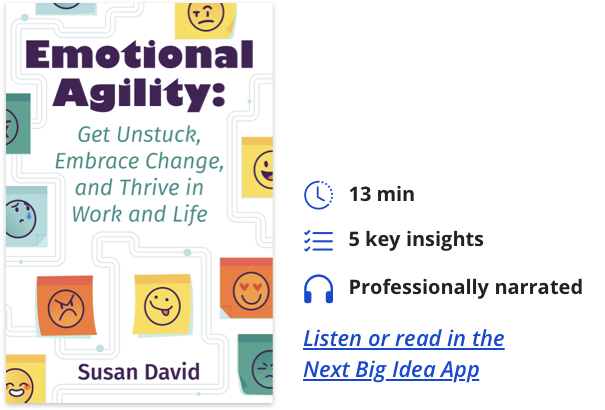Since it was first published in 2016, Emotional Agility: Get Unstuck, Embrace Change, and Thrive in Work and Life has become essential reading for anyone who wants to learn the psychological skills critical to thriving in times of complexity and change. A #1 Wall Street Journal bestseller, a Forbes Recommended Book for Leaders, and an Amazon Best Book of the Year, Emotional Agility argues that the way we navigate our inner world is the single most important determinant of our life success. The author, Susan David, is an award-winning Harvard Medical School psychologist and a world-renowned expert on emotions, happiness, and achievement.
In our series of “Book Bite Classics,” we share five key insights from groundbreaking, beloved books that everyone should read. Below you’ll find one big idea from Emotional Agility—to read or listen to the remaining four, download the Next Big Idea App today.

Big Idea: Give your past negative experiences a fresh perspective.
People with emotionally rigid responses to situations, both negative and positive, often get “stuck” in seeing situations from one, fixed perspective. This can lead to depression, anxiety, and overall decreased quality of life. In 1983, James Pennebaker, social psychologist and professor at the University of Texas at Austin, set out to find a different option. Pennebaker explored the idea of spending some time each day writing about emotionally significant experiences. Through his own writing, research, and experiments, Pennebaker learned that this process allowed him and participants to “step out” of their experiences and gain a new perspective on them. Susan David refers to this as a meta-view, or the view from outside your own perspective that broadens the way you understand the context of the situation.
“Stepping out” of your own experience and seeing it in a new context allows you to become emotionally agile in your response. Simply pausing to reflect on the situation, understand the context, and choose how you want to respond can change your life. Research shows that there are a number of techniques to get yourself to “step out” of your own experience. Here are some that have been proven to be the most successful:
- Think about the growth process you want to enact.
- Embrace and accept contradictions in your life.
- Find humor in the situation.
- Look at the situation from someone else’s point of view.
- Call out your thoughts and emotions as they are.
- Speak to yourself in the third person.
Any of these techniques can be useful for stepping out of your own perspective and finding new contexts for any negative situation, allowing you to respond in ways that align with your values and beliefs.
To read or listen to the rest of this Book Bite, download the Next Big Idea App today:































